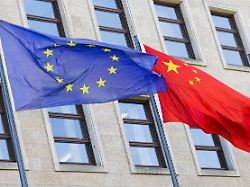Risk analysis plan
Brussels wants to protect critical technologies
October 3, 2023, 5:51 p.m
Listen to article
This audio version was artificially generated. More info | Send feedback
In the wrong hands, so-called critical technologies can pose a risk to security in Europe. The EU Commission therefore wants to protect itself from possible competitors such as China. Member states are expected to examine potential risks by the end of the year.
In view of the growing rivalry with China, four security-relevant technology areas in the EU are to be subjected to a comprehensive risk analysis by the end of the year. According to the Brussels authority, it is about technology and knowledge for artificial intelligence (AI) and modern semiconductor products as well as bio and quantum technologies.
Depending on the outcome of the analysis, protective measures should then be taken in further steps. This could be, for example, export controls, but also efforts to reduce dependence on certain suppliers. It is about preserving the strategic interests and security of the EU, said the responsible EU Commissioner Thierry Breton. Partner states such as the USA, Great Britain, Australia and Japan also took a similar approach.
According to the Commission, the four technology areas were selected based on a list of specific criteria. These include the potential that technologies have for fundamental changes in the economic world. There is also the question of the extent to which the technologies in question could also be used militarily or to restrict fundamental rights such as freedom of expression. An example of the misuse of artificial intelligence is tools that could manipulate public opinion in election campaigns via social networks and the Internet.
The risk analysis should be carried out together with experts from the Member States. According to the information, consultations with actors from the private sector are also planned – with assurances of absolute confidentiality. The plans presented are part of an economic security strategy.
EU has become the target of economic pressure
Commission President Ursula von der Leyen has recently repeatedly taken the position that the EU’s policy towards China must change. The country has therefore moved away from a reform and opening policy towards a security and control policy to which a reaction must be made. At the same time, von der Leyen repeatedly emphasizes that, in her view, a decoupling from China is neither feasible nor in Europe’s interest. That’s why, on the one hand, we should keep communication channels open and work with China on issues such as climate change, pandemic preparedness and financial stability. On the other hand, it is about the EU becoming more independent and minimizing economic risks, for example in the supply chains of European companies.
Part of the larger concept is also a new sanctions instrument, which the European Parliament approved. For example, it is intended to enable punitive tariffs against third countries that attempt to use economic measures to inadmissibly intervene in the political decisions of the EU or the EU member states. The reason for the introduction of the new instrument is that the EU and its member states have become the target of conscious economic pressure in recent years. For example, China imposed trade restrictions against Lithuania that, from a European perspective, were incompatible with the rules of the World Trade Organization and also affected other exports from the EU internal market.
